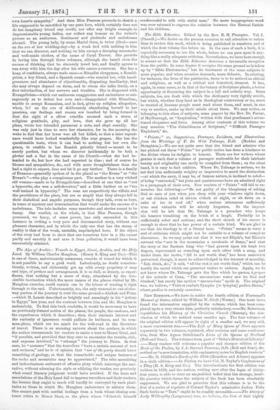" Points ;" or, Suggestions, Passages, Incidents, and Illustrations from
the Writings of T. De Witt Talmage, D.D. (Hodder and Stoughton.)—We are not quite sure that the friend and admirer who has picked out these "Points" for public notice has done a kindness to the divine whom he delights to honour. There are few writers whose genius is such that a volume of passages noticeable for their intrinsic beauty and originality can easily be compiled from them ; on the other hand, it is easy to find oddities. Where Dr. Talmage is serious, we do not find him sufficiently weighty or impressive to merit the distinction —at which the envy, it may be, of human nature, is inclined to rebel— of being "extracted," but jests and quaintnesses have an admitted right to a paragraph of their own. Few readers of "Points" will fail to re- member the following:—" Be not guilty of the blasphemy of asking God to care of you when you sleep with your windows right down, or eat chicken salad at eleven o'clock at night, or sit down on a cake of ice to cool off," when serious utterances sufficiently true and valuable will be utterly forgotten. So the impres- sion will be left that Dr. Talmage is a preacher who keeps his hearers trembling on the brink of a laugh. Probably lie is sufficiently sober and serious; and the short sketch of his career is enough to show that he has power of a certain kind. We are glad to see that his theology is of a liberal tone. "Points" seems to want a sort of criticism which might not be suitable to a volume of complete discourses. So we may point out that it was not Elijah's, but Elisba's servant who "saw in the mountains a cavalcade of flame," and that the story of the Eastern king who " had graven upon his tomb two fingers, represented as sounding upon each other with a snap, and under them the motto, "All is not worth that," has been somewhat perverted, though, it must be acknowledged in the interest of morality, "Eat, drink, &c.," it said, "all the rest is not worth that," which can be hardly the moral which our preacher wishes to enforce. Again, we do not know where Dr. Talmage gets the lino which he quotes, apropos of the miracle of Cana, "The unconscious water saw its clod and blushed," but surely-the epithet " unconscious " spoils it. The original was, we believe, " Vidit et erubuit Nympha [or lympha] pudica Deum," where pudica is certainly conscious.


































 Previous page
Previous page